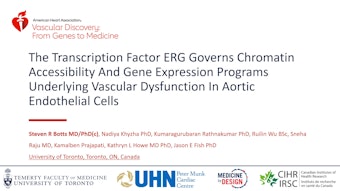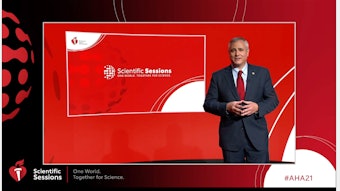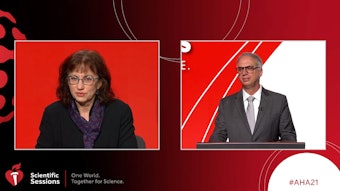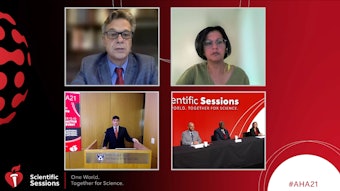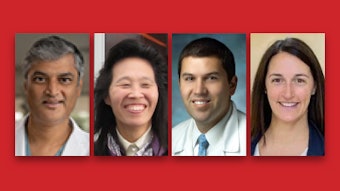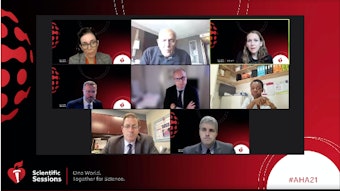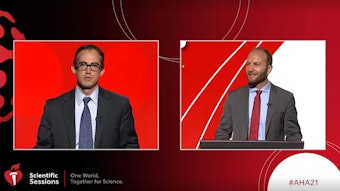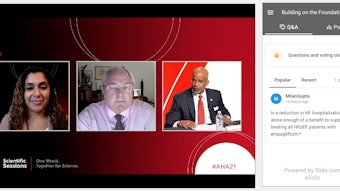Q&A: A year in review for Resuscitation Science and ILCOR
A conversation with Lance Becker, Dianne Atkins and Katherine Berg.
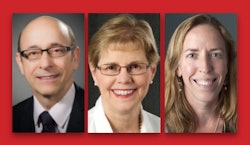
2021 was a banner year in resuscitation for adults and pediatric populations, as well as for the International Liaison Committee on Resuscitation. The Daily News talked with representatives of each area prior to their presentations at the Plenary Session: The Year in Review and ILCOR.
The speakers addressed their view of the year. They are:
- Lance B. Becker, MD, FAHA, professor, Institute of Bioelectronic Medicine, Feinstein Institutes for Medical Research, chair and Dorothy and Jack Kupferberg Professor of Emergency Medicine, Donald and Barbara Zucker School of Medicine at Hofstra/Northwell in Manhasset, New York
- Dianne Atkins, MD, professor of pediatrics, University of Iowa School of Medicine in Iowa City
- Katherine Berg, MD, associate director of the Center for Resuscitation Science and assistant professor of medicine at Beth Israel Deaconess Medical Center in Boston. Berg is vice chair of the Advanced Life Support Task Force with ILCOR (International Liaison Committee on Resuscitation).
The plenary is scheduled for Noon to 1 p.m. EST, Sunday, Nov. 14.
Q: Can you sum up 2021 in three (or so) words?
Dr. Atkins (pediatrics): Stimulating, broad topics, but need for additional research.
Dr. Becker (adults): Really hard year.
It has been a really hard year for anyone involved in the frontline resuscitation of patients. We have put this past year into the context of three major challenges:
- the threat to our health due to the combined impact of COVID on top of cardiac arrest
- the hit to our communities due to inequality of health care and structural racism that has been amplified by the pandemic
- the worsening of our economy that ultimately must support health care and the quest for new discoveries.
Q: What are some of the highlights of the year?
Dr. Atkins (pediatrics): The biggest topic this year comes from two publications comparing compression-only CPR with chest compressions with rescue breaths for infants, children and adolescents. Both papers conclude that compressions combined with rescue breaths result in better survival and neurologic outcomes for this population. The other significant topic is the timing of epinephrine (adrenaline) in pediatric cardiac arrest.
Dr. Becker (adults): The latest publications in many fields, including:
- advanced resuscitation with extracorporeal membrane oxygenation
- the role of targeted temperature management
- new drugs for resuscitation
- the impact of COVID and important lessons learned from COVID that may improve our future emergency care
- the impact of health disparities and inequality in access to medical care in the United States
- new horizons for machine learning and artificial intelligence in resuscitation
- considering how long EMS rescuers should remain on scene versus load the patient for transportation to the hospital
- role of acute immediate percutaneous interventions (PCI) compared to delayed PCI
- engaging with survivors and patients on research priorities for the future.
Dr. Berg (ILCOR): The Advanced Life Support (ALS) Task Force addressed coronary angiography after return of spontaneous circulation. We also reviewed CPR in the prone position, a topic with very little evidence behind it but that became highly relevant with the COVID-19 pandemic. ALS has also completed a review of therapeutic temperature management (TTM) in recent months and has already posted a draft Consensus on Science with Treatment Recommendations online. The Basic Life Support Task Force conducted multiple scoping reviews on resuscitation in the setting of drowning. The Neonatal Life Support Task Force conducted massive systematic reviews of cord management at birth and has new recommendations for family presence during resuscitation. The Education, Implementation and Teams Task Force reviewed digitally based BLS training, which is even more relevant now with so much being done virtually. Our COVID working group has updated recommendations on guidance around infection transmission during resuscitation. The First Aid Task Force has new reviews and recommendations on hydration and cooling of burns.
Q: What’s the year been like for resuscitation research funding?
Dr. Becker (adults): It has been a very difficult year for resuscitation research funding. The field even before COVID had been suffering for many years from poor funding. Organizations like the NIH have failed to provide robust funding on a par with most other deadly conditions. With COVID, these “funding disparities” for life-saving methods have become worse.
Q: How has the COVID-19 pandemic affected the year?
Dr. Atkins (pediatrics): We have very little data on how COVID-19 has affected frequency or outcomes for pediatric cardiac arrest. This is an area ripe for research. Children are less severely affected, and the death rate is considerably lower, but we need to understand if COVID increases the risk of cardiac arrest. We also need a better understanding of multisystem inflammatory syndrome in children and its relationship to cardiac arrest.
Dr. Becker (adults): There has been a noticeable reduction in survival rates across the country. Communities undergoing medical system stress due to COVID have also seen a negative impact on many aspects of the chain of survival for both COVID and traditional cardiac arrest patients.
Dr. Berg (ILCOR): Our work has been fully virtual this year. Most of our task force members have also been pulled for extra clinical work in their roles as critical care, emergency medicine and other acute care specialties. These time commitments in some cases slowed our ILCOR work, but I think we completed an impressive amount, especially considering the impact of the pandemic. We have very much missed being able to connect in person once yearly, and I hope in-person meetings can resume at some point.
Q: How does 2021 compare to other years?
Dr. Atkins (pediatrics): The pandemic has likely slowed the rate of research and publications on pediatric cardiac arrest as our emergency medicine and critical care physicians were the ones whose clinical responsibilities were dramatically increased by the pandemic. Pediatric cardiac research is difficult to perform because it is an uncommon event at most hospitals. Thus, the need for multicenter coalitions and cooperation is paramount.
Dr. Becker (adults): The year has been worse in terms of outcomes and more preventable deaths. However, the research would suggest many newer approaches that are near the horizon, which will improve survival in the future.
Dr. Berg (ILCOR): I think the main difference has been conducting all of our work virtually, and the impact COVID-19 has had on many members. ILCOR also continues to work on accelerating the speed at which we address and incorporate new evidence, as we did this year with TTM. We have also been responsive to the clinical need for guidance due to changes brought by COVID, that is, prone CPR and infection transmission during resuscitation.
Q: What can resuscitation researchers and clinicians learn from 2021?
Dr. Becker (adults): There are so many lessons that we can all learn from this year to improve our future years. We need to examine the year, consider the lessons learned in biology, in public health, in policy and in politics in order to elevate the field in the coming years.
Dr. Berg (ILCOR): That we are adaptable, and that ILCOR volunteers will go above and beyond to get the work done.
Q: What are your concerns for the year ahead?
Dr. Becker (adults): The lack of funding for resuscitation research not only inhibits the research we do this year, but it profoundly impacts future discoveries by discouraging young people from making a career choice to pursue resuscitation research. This has already led to a severe reduction of our pipeline of new young researchers developing innovative new science. In my opinion, the whole field is undergoing a downturn. If we do not reverse this negative trend, the science goes slower, discoveries are deferred for years, and ultimately there are preventable deaths that occur due to our inability to move the field forward.
Dr. Berg (ILCOR): I think engaging new volunteers in this work is challenging virtually, without those in-person connections.
Q: What’s next? What do you think the topics of this update will be next year?
Dr. Atkins (pediatrics): Some of the biggest topics include neuroprognostication during the resuscitation and within the immediate 12 to 72 hours after the arrest. Additionally, post-cardiac care is a significant topic of concern. Implementation of the science into the clinical arena is very important to increase neurologic outcomes.
Dr. Becker (adults): Hopefully, we will see a steady progression of new discoveries, enhanced investment and better policy to save more lives.
Dr. Berg (ILCOR): Temperature management, systematic reviews on resuscitation in drowning and many other topics on which new data are emerging.


